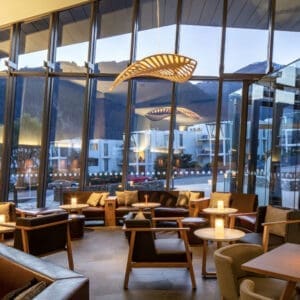 Tourism makes a significant contribution to global economic development. However, the whole industry currently faces the challenge of sustainability. How can the growth of tourism be managed while respecting the environment? How can local populations be involved in the decisions and the redistribution of profits? These questions are vital if tourism is to be and remain an activity that benefits everyone.
Tourism makes a significant contribution to global economic development. However, the whole industry currently faces the challenge of sustainability. How can the growth of tourism be managed while respecting the environment? How can local populations be involved in the decisions and the redistribution of profits? These questions are vital if tourism is to be and remain an activity that benefits everyone.
Tourism, a driver of socio-economic progress
Since 2012, over one billion tourists leave their countries to travel abroad every year. International tourism is now one of the world’s largest economic sectors. It represents 9% of global GDP and earned receipts of over 1,159 billion dollars in 2013.
Every year, the tourism sector records strong growth. In 2013, it exceeded the global economic growth rate with a 4% increase in international travel. The world’s first tourism source market is now… China!
In addition to the traditional destinations like Western Europe and North America, new destinations are emerging, such as Laos, Mongolia and Burma. In 2013, the Asia-Pacific region recorded the highest increase in inbound tourism arrivals (6%), ahead of Europe (5%) and Africa (5%).
 Tourism really has become a driver of socio-economic progress, notably due to its capacity to generate new companies and new jobs. For example, one in eleven jobs is currently provided by the tourism sector. The World Travel & Tourism Council (WTTC) estimates that by 2024, about 23.2 million new jobs will be directly created by the tourism sector.
Tourism really has become a driver of socio-economic progress, notably due to its capacity to generate new companies and new jobs. For example, one in eleven jobs is currently provided by the tourism sector. The World Travel & Tourism Council (WTTC) estimates that by 2024, about 23.2 million new jobs will be directly created by the tourism sector.
The growth of tourism is now an essential aspect of a country’s economic performance. In some cases, for example in Morocco and Spain, it has even become a leading aspect.
The challenges of sustainable tourism
The challenge of sustainability concerns the tourism industry on several accounts. Firstly, mobility, with, for example, the increase in international air traffic (+5.7% in September 2013 compared with September 2012) which raises questions regarding atmospheric pollution. Tourism is apparently responsible for about 4.6% of global greenhouse gas emissions. Another key issue is the preservation of water resources: swimming pools, spas and golf courses are part of the world of tourism, but can also become real problems in countries where water is scarce if no eco-responsible measures are taken.
Another issue is waste. One tourist produces about 1.5kg of waste a day. The island of Thilafushi, in the Maldives, is a textbook case regarding this issue. This island, once a corner of paradise like its neighbors, is now an island made of trash where garbage brought from the other islands is regularly burned.
Lastly, tourism sometimes has a disastrous impact on populations resulting in sex tourism, population displacements, lack of respect for local traditions, etc. The scandal of the “human safaris” in Peru is a case in point. Tourists dream of meeting the Mashco-Piro, one of the last remaining tribes on the planet to live completely cut off from the outside world… at the risk of contributing to their disappearance.
Nowadays, 70% to 80% of tourism receipts benefit countries in the North. The issue of the redistribution of the receipts in the destination countries is therefore crucial.
 Sustainable development, a key issue for tourism
Sustainable development, a key issue for tourism
The European Charter for Sustainable Tourism was published in 1995. It declared that “tourism is ambivalent, since it can contribute positively to socio-economic and cultural achievement, while contributing to the degradation of the environment and the loss of local identity and must therefore be addressed from a global perspective.” Since then, the World Tourism Organization (WTO) as well as companies working in the tourism sector have rallied to make their activity a viable one for the long term.
One of the solutions to the environmental risks engendered by tourism is ecotourism, a term that reconciles tourism and sustainable development. Ecotourism aims to preserve the natural and cultural heritage, educate both the tourists and the locals and also get local populations involved in the tourism sector. For a long time Costa Rica was a reference in ecotourism: when it opened up to tourism in the 1980s, the country endeavored to respect the principles of ecotourism and built its image on this model in order to attract international tourists.
The development of ecotourism in the country was not possible without the involvement of the Costa Ricans, who were sensitized to the challenges posed by tourism and the conservation of the environment: protect nature, attract visitors and create new jobs. Now, ecotourism represents 5% of GDP and Costa Rica welcomes over 2 million foreign tourist every year. However, Costa Rica is a victim of its success and the grand principles of ecotourism are now being shaken by the pressure of mass tourism. The long-time fiercely protected natural habitats are threatened by the excessive number of visitors. Restaurants, hotels, and leisure infrastructures are appearing on the beaches and in the heart of pristine forests as foreign developers and investors flout environmental conservation laws to welcome travelers seeking a nature experience. Will the next challenge for Costa Rica be to find ways to reconcile mass tourism and ecotourism? This will be necessary if the country is to honor its commitment to become the first “carbon neutral” country by 2021.
Sustainable tourism at Accor
As an actor in the tourism industry, Accor endeavors to incorporate sustainable development principles in each of its activities all over the world.
In Mauritius, where Accor is present with the Sofitel So Mauritius and the Sofitel Mauritius L’Impérial Resort & Spa, roving Academies trained future local employees.
 Mariola Mariola Maria Seebrunah (picture above), a Mauritian, was recruited as a trainee waitress in 1991 at L’Impérial. Now, she is head waitress there and explains who she has learnt constantly throughout the 23 years she has spent in this prestigious establishment. In 2002 she was also able to go to France to the ibis Thalasso Thérapie in Hyères, where she met people from Brazil, Morocco, Canada, and many other countries. “Visiting this magnificent country […] helped me gain a better understanding of Sofitel’s vision of offering French elegance with the best of local culture.”
Mariola Mariola Maria Seebrunah (picture above), a Mauritian, was recruited as a trainee waitress in 1991 at L’Impérial. Now, she is head waitress there and explains who she has learnt constantly throughout the 23 years she has spent in this prestigious establishment. In 2002 she was also able to go to France to the ibis Thalasso Thérapie in Hyères, where she met people from Brazil, Morocco, Canada, and many other countries. “Visiting this magnificent country […] helped me gain a better understanding of Sofitel’s vision of offering French elegance with the best of local culture.”
In Burma, where Accor inaugurated the MGallery The Lake Garden in Nay Pyi Taw and the Novotel Inle Lake Myat Min (the first Novotel to open in this country) at the end of 2014, the Group wants its expansion to be accompanied by initiatives implemented by Solidarity Accor, its endowment fund. Burma, which is starting to open up to the international community after decades under the rule of a military junta, is one of the poorest countries in the world: 35% of the population lives below the poverty line.
Solidarity Accor works with the association FXB International, allowing 80 young girls aged 15 to 24 who have no schooling, are often orphans and live in extreme poverty, to receive training in hand-weaving and interior decorating. The program, intended to last one year, can be extended for those who want to receive longer training. During this year of training, the young women are fed and accommodated on site and benefit from one-to-one interviews.
 Henceforth, tourism industry players, whether they are institutionals or international groups, are keen to act responsibly and ensure the longevity of their activities. However, they are not alone. The tourists themselves are also now aware of the need to conserve the planet so that future generations can in turn discover its wonders. A survey conducted by Trip Advisor in 2012 found that over 70% of the tourists surveyed said they plan to make more eco-friendly choices in the future.
Henceforth, tourism industry players, whether they are institutionals or international groups, are keen to act responsibly and ensure the longevity of their activities. However, they are not alone. The tourists themselves are also now aware of the need to conserve the planet so that future generations can in turn discover its wonders. A survey conducted by Trip Advisor in 2012 found that over 70% of the tourists surveyed said they plan to make more eco-friendly choices in the future.















